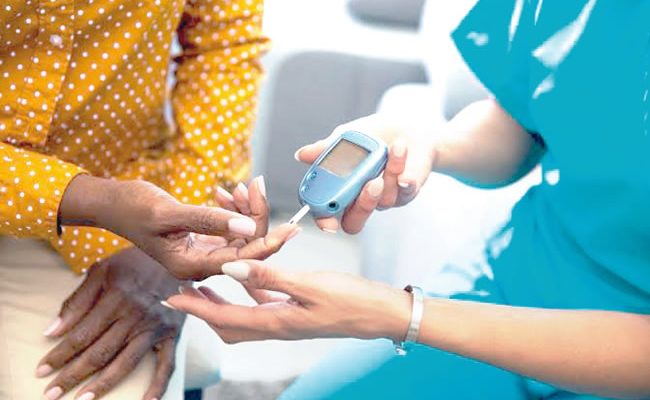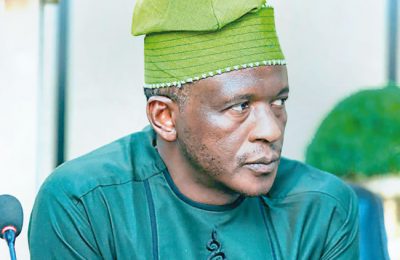As Nigeria continues to experience a rising tide in non-communicable diseases, including diabetes, VINCENT KURAUN’s highlights the challenges posed by the lack of preventative measures, inadequate access to affordable healthcare, and the societal stigma surrounding diabetes.
NIGERIA faces a significant diabetes crisis, with an estimated 11.2 million people currently living with the disease, according to the Diabetes Association of Nigeria (DAN). This represents about 5.77 per cent prevalence for a disease that affects a range of ages while the high prevalence is attributed to poverty and limited health care access, among other issues.
The International Diabetes Federation (IDF) Diabetes Atlas (2021) report shows that 10.5 per cent of the adult population has diabetes, with almost half unaware that they are living with the condition. The same IDF predicts that by 2045, diabetes will affect one in eight adults globally.

The prevalence of this non-communicable disease is a growing concern in Nigeria. The story of Araoluwa, a young man battling diabetes, is all too common. But his journey and the quiet determination he displays underscores the stark realities faced by young patients in a nation struggling to keep up with the escalating health crisis.
While the campus life was buzzing with sports and other activities, the diagnosis of Type 1 diabetes weighed heavily on the small frame of the 22-year-old student of Medicine and Surgery in one of the public universities in South-Western Nigeria.
His world, hitherto vibrant and full of the energy for a young man, had been abruptly dimmed by the relentless march of the disease. He recalled, just a few months ago, how he was a whirlwind of energy, competing in the university sports activities. Now, his laughter was more hesitant, his once bright eyes often clouded with exhaustion.

Diabetes, a chronic condition traditionally linked to older age in Nigeria, is now impacting younger individuals, including Araoluwa. The rising prevalence, coupled with limited access to proper healthcare and the high cost of treatment paint a stark picture of an already growing health crisis.
“He started complaining of intense thirst and frequent urination, a worrying combination,” Araoluwa’s mother recounted.
“We took him to a small clinic, but they only had basic tests. It wasn’t until he was admitted to the University Teaching Hospital that the diagnosis became clear to us.”
According to his mother, the diagnosis wasn’t just a medical label; it forced them to make life-altering adjustments. “The injections of insulin and the strict dietary regimen all felt like an insurmountable burden for us as a family that is struggling to make ends meet.
“Insulin is expensive, and the cost of a daily dose ate deeply into our savings,” explained his mother as tears flowed from her eyes. “Finding the right dosage is also tricky. A slight error can have serious consequences.”
This is where Araoluwa’s diary comes in. It’s not filled with routine or lecture notes, but meticulously recorded blood sugar readings, medication schedules, and food intake details. He receives support from his school nurse who has been educated about managing diabetes by the university clinic. They help with recording and interpreting his data.
“This systematic approach is crucial for his management and helps him communicate effectively with his healthcare team,” the nurse explained.
Despite a challenging daily life with a chronic illness, Araoluwa remains determined to become a doctor as he hopes to help others like him. His family’s support fuels his unwavering hope and serves as an inspiration.
Araoluwa’s struggle with diabetes is not solely about personal story but one that reflects a broader challenge facing many young Nigerians. Limited access to quality healthcare and the high cost of essential medications are significant obstacles in many areas and Araoluwa’s situation highlights the critical need for affordable and accessible diabetes management resources in the country.
As the story hots up for many diabetic patients, World Diabetes Day 2024, which was observed on November 14, 2024 with the theme “Breaking Barriers, Bridging Gaps,” underscores the urgent need for action as the theme focuses on addressing the systemic and societal challenges that hinder access to diabetes prevention, diagnosis, and treatment. The campaign was aimed to highlight and overcome inequalities in care, potentially focusing on disparities in resources, education, and healthcare infrastructure.
Factors affecting diabetic treatment
For those unfamiliar with the disease, “Diabetes mellitus is a chronic disease that results from the body’s inability to make use of glucose. This is due to the deficiency or reduced production of insulin, a hormone needed by the body to make use of glucose. Glucose is produced from the food we eat,” stated Dr Ifedayo Adeola Odeniyi, an Associate Professor of Endocrinology in the Department of Medicine, College of Medicine, University of Lagos.
Emphasising the significant barriers to affordable and accessible diabetes medications and supplies in Nigeria, Dr Odeniyi, who doubles as an Honorary Consultant Physician/Endocrinologist at the Lagos University Teaching Hospital (LUTH), said the situation “is fraught with several challenges.”
According to him, Nigeria faces numerous barriers to effective diabetes management. These include high poverty rate that makes care unaffordable for many, currency devaluation, increasing medication costs, inadequate health insurance coverage, and weak health care infrastructure, particularly in rural areas.”
Other obstacles mentioned by the expert are shortage of skilled healthcare professionals, poor distribution networks, and limited government support for local production of medication further compound the problem. “Cultural and social factors such as low awareness, stigma, and dietary challenges equally contribute to it,” he noted.
He also added that expensive technologies, inconsistent supply chains, rising prevalence of the disease, and climate/environmental factors as strains in the system that hinder access to essential supplies and consistent care.
“The high poverty rate is a contributing factor. A significant portion of the population lives below the poverty line, making out-of-pocket payments for diabetes care unaffordable.
“Frequent devaluation of the naira increases the cost of imported medications and supplies,” he noted while adding that most Nigerians do not have access to comprehensive health insurance, and existing schemes often exclude chronic disease management.
Further citing weak infrastructure, shortage of skilled professionals, and poor distribution networks as contributing factors, Odeniyi said, “Inadequate healthcare facilities, particularly in rural areas, limit access to diagnosis and consistent care. Also, there are insufficient endocrinologists, diabetes educators, and trained healthcare workers in the country. Medicines and supplies are often unavailable in rural or underserved areas due to logistical challenges.”
On the regulatory and policy issues, Dr Odeniyi highlighted the lack of local production, weak registration and limited government support as the key areas affecting diabetes management.
“Dependence on imported medications and supplies increases costs and vulnerability to global market fluctuations.
“Substandard and counterfeit medications are common, undermining patient trust and health outcomes and insufficient funding and prioritisation for diabetes in national health policies contribute to poor resource allocation.”
Odeniyi also cited low awareness, stigma, and dietary challenges as cultural and social factors hindering diabetes management.
“Many people with diabetes remain undiagnosed due to poor health literacy and lack of awareness campaigns. Also, the social stigma associated with chronic diseases may prevent people from seeking timely care and consumption of food without moderation.”
On the cost of supplies and global challenges, the associate professor said expensive technologies, inconsistent supply chains, rising prevalence, and climate and environmental factors are some of the challenges.
“Continuous glucose monitors, insulin pumps, and newer therapies remain out of reach for most. Stockouts of insulin and test strips are frequent, increasing reliance on expensive private options.
“The growing number of diabetes cases adds pressure on an already strained system. Poor infrastructure has also hindered the storage and transportation of temperature-sensitive medications like insulin.”
Also corroborating Dr Odeniyi, a consultant family physician and certified global health project management professional, Dr Adokiye Berepiki, explained the crucial role of insulin in the management of diabetes, saying “Insulin is a hormone which is secreted by beta cells of the pancreas, an endocrine gland in the body that helps to regulate blood glucose.”
According to him, this “insulin can be produced artificially. When blood glucose is elevated the body produces insulin to lower it.”
Though there are different types of diabetes globally, the most common types of diabetes diagnosed in Nigeria, Dr Odeniyi said: “are Type 1 diabetes mellitus, Type 2 diabetes mellitus, gestational diabetes mellitus, and others.
“Type 1 diabetes mellitus is commonly seen in children and young individuals while Type 2 diabetes mellitus is the most common type seen in the majority of people with diabetes mellitus. Gestational diabetes mellitus is the diabetes that is first diagnosed in a pregnant woman at 24 to 28 weeks. Other types of diabetes mellitus are caused by other endocrine disorders.”
Diabetes poses great risk for mothers, infants
Emphasising the risks of gestational diabetes, resident doctor, department of Obstetrics and Gynaecology at LUTH, Dr Margaret Obienu, disclosed that it has potential complications for both the mother and the fetus.
According to her, “the potential maternal complications during pregnancy and childbirth include polyhydramnios, pre-eclampsia, preterm labor, and the development of diabetes later in life.”
For the fetal complications associated with maternal conditions, she said, this can include fetal macrosomia (baby weighing 4kg or more at birth), leading to complications like hypoglycemia and jaundice.
“Preterm delivery poses various challenges for the infant and respiratory distress syndrome, potentially caused by delayed lung maturation from diabetes.”
Other complications, according to her, are “stillbirth, increased risk of obesity and type 2 DM later in life for the child.”
Dr Obienu offered specific recommendations for individuals with diabetes preparing for pregnancy. “Diabetic women desirous of pregnancy should seek and have preconception care at least three months before conception for a proper evaluation to ensure their health status is optimal before they begin the pregnancy journey.”
This, she said, would reduce the risk of adverse outcomes for the mother and her baby.
Regarding genetics and diabetes risk, and what people can do to reduce their chances of developing the disease, Dr Adokiye explained that “there is a strong relationship between diabetes mellitus and genetics. A person is likely to develop diabetes mellitus if his first-degree relatives have the condition.”
He highlighted these key lifestyle changes for preventing or managing diabetes effectively. “A person at risk of having diabetes mellitus can reduce the chances of its occurrence by eating a healthy diet which is low in carbohydrates, high in vegetables and lowered intake of processed food as well as maintaining a healthy weight.”
According to him, these lifestyle modifications, which include incorporating regular physical activity, are also helpful.
“Key lifestyle changes include having at least 30 mins of physical activity five days a week, avoiding/minimising a sedentary lifestyle. Having periodic health screening.”
Corroborating him, Dr Odeniyi outlined specific dietary recommendations for preventing and managing diabetes within a Nigerian context. “There are no specific dietary prescriptions for people with diabetes mellitus, however, moderation is the keyword. Reduction in caloric intake of whatever food is consumed. We advise people with diabetes mellitus to avoid ‘soft drinks’. Our traditional foods are good, if consumed in moderate quantities. Further guidance to the person with diabetes mellitus comes from the dietician.”
Why there’s high prevalence in South-South
Dr. Odeniyi also discussed the high rates of diabetes across Nigeria and the specific factors driving it, saying, “The prevalence of diabetes mellitus varies across the six geopolitical zones in Nigeria.
“The highest prevalence is found in the South-South zone. The overall prevalence in Nigeria is 5.6 per cent in adults. There is no specific contributing factor in any of the regions. What is common is a sedentary lifestyle, lack of exercise, obesity or being overweight, family history of diabetes mellitus, smoking, and alcohol consumption. These are the risk factors across the geopolitical zones.”
Odeniyi noted that many common misconceptions surround diabetes mellitus.
“Some people think it is a spiritual attack. Some people think it is due to an infection. I cannot list all the misconceptions about the causes of diabetes mellitus. There are misconceptions about how it is treated. Education of the populace will address all these misconceptions,” he advised confirming that significant research and public health initiatives in Nigeria are addressing diabetes prevention, management, and treatment.
According to him, Nigeria is undertaking a multi-pronged approach to addressing the rising prevalence of diabetes. One of such is Project 10 Million which focuses on large-scale screening and equitable access to care.
“This nationwide campaign aims to screen 10 million Nigerians for hypertension and diabetes to improve awareness, early detection, and access to care. It emphasises equitable health care access in underserved regions and aims to establish comprehensive disease registries to inform future health care policies.”
He disclosed that a collaborative research with a foreign institution is developing culturally sensitive diabetes education for patients and providers.
“A partnership between the Medical College of Wisconsin and Nigerian institutions is focused on developing an educational curriculum for diabetes patients and healthcare providers. This research assesses cultural health capital to improve interactions between patients and providers, ultimately enhancing diabetes management outcomes,” he added.
He also stated that the DAN plays a long-standing role in advocacy, education, and research in the area.
He said: “DAN has been pivotal in diabetes advocacy, education, and research for over two decades. It organises national conferences, public awareness campaigns, and diabetes screenings while funding research to enhance treatment and prevention strategies in Nigeria.”
It is, however, left to be seen how much impact these initiatives will have on the current diabetes status of Nigeria. But for now the situation remains dicey with the disease’s continued rampage among the youth.
READ ALSO: Late diabetes detection responsible for health complication — Group







